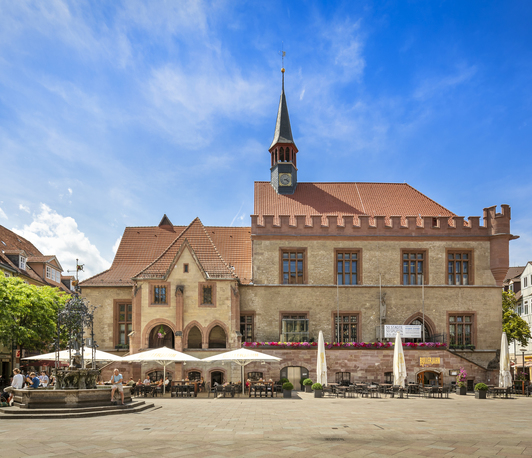Max Planck Day: Friday, 23 June 2023, Göttingen
- Date: Jun 23, 2023
- Time: 01:00 PM - 09:00 PM (Local Time Germany)
- Location: Göttingen
- Host: Max Planck Society

Programme:
1 pm: Science market in front of the Old Town Hall, Markt 9, 37073 Göttingen
From the sun to the molecule – Max Planck Research in Göttingen
How do scientists research and visualize “super diversity” in Mega Cities like New York? How do nanomachines work in living cells? How do wind turbines influence each other? And how do you unlock the secrets of the Sun? The Max Planck Institutes in Göttingen give you the answers to these and many other questions. Come by and learn more about the versatile Max Planck research in the city that creates knowledge.
Flower meadow and rainforest - How climate is changing our nature
Climate change is altering biodiversity and threatening ecosystems. Two projects of the Max Planck Institutes for Chemistry and for Biogeochemistry show how these aspects are being researched: The 325m high ATTO measurement tower in the Amazon helps us investigating the mutual influence of rainforest, atmosphere and climate. The Flora-Incognita app makes plant identification with a smartphone easy-peasy. The data collected shows us how the plant world is changing in the course of climate change.
Inside Criminal Minds – Research using Virtual Reality at MAXLab Freiburg
How do criminals make their decisions? Criminologists at the Max Planck Institute for the Study of Crime, Security and Law are tackling this question with the help of virtual reality (VR). This technology allows researchers to analyze the behavior of criminals in the virtual world in order to draw conclusions about the real world. MAXLab Freiburg is the first independent research laboratory to conduct this type of criminological research by means of VR.
MPNeuro – The amazing brain
All nervous systems consist of the same building blocks - nerve cells. Nevertheless, brains master the most diverse challenges. Share in our passion as four Max Planck Institutes help you experience the workings of the brain. Look at neurons under the microscope, control a prosthetic hand with your mind, program a robot and craft your own brain hat. Discover how flexible your brain can be!
3 pm to 4 pm:
Sustainability programme on the Max Planck Campus at Faßberg (in German)
7 pm:
Research Theatre and Science Slam in the Old Town Hall (in English)
Markt 9, 37073 Göttingen
The Max Planck Day ends with an exciting evening program in the Old Town Hall:
How is an antibiotic created? A research theatre from the world of microbes.
Without what bacteria produce, our lives would look very different. Antibiotics like penicillin, cancer drugs, medicines needed for organ transplants - many of these drugs are produced by bacteria and often only minimally modified by chemists in the laboratory.
An important class of these microbial natural products are peptides, i.e. small proteins produced by non-ribosomal peptide synthetases (NRPS). As long as the name of these mega-enzyme complexes is, as great is their function. We at the Department of Natural Products in Organismal Interactions at the Max Planck Institute for Terrestrial Microbiology in Marburg have been on the trail of these mini-factories for a while. In order to make the complexity of these enzymes clear to you as well, we would like to demonstrate their function in a "playful" way. Nothing is left to chance and you will see that complex natural substances can only be built up and even reassembled if all parts of the enzymes or all members of a working group work together.
Afterwards, six young scientists from the Max Planck Society will present their respective research in the Science Slam:
Sergio San Miguel, Max Planck Institute for Infection Biology, Berlin
Alina Studenova, Max Planck Institute for Human Cognitive and Brain Sciences, Leipzig
Monica Gobran, Max Planck Institute for Multidisciplinary Sciences, Göttingen
Varatharaja Nallathambi, Max-Planck-Institut für Eisenforschung GmbH, Düsseldorf
Valentin Thoss, Max Planck Institute for Extraterrestrial Physics, Garching
Ricardo Fernandes, Max Planck Institute of Geoanthropology, Jena
Free entry! Registration required: https://gv-events.mpg.de/e/slam











